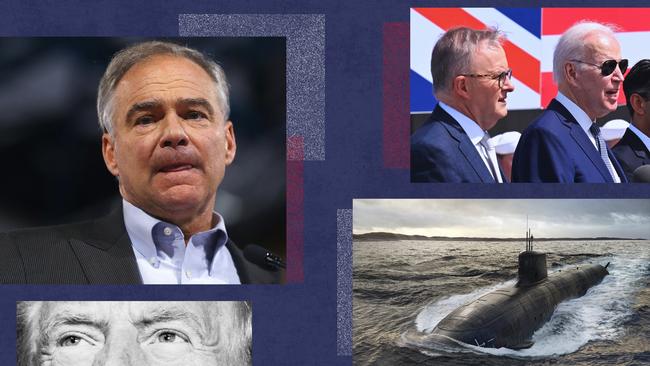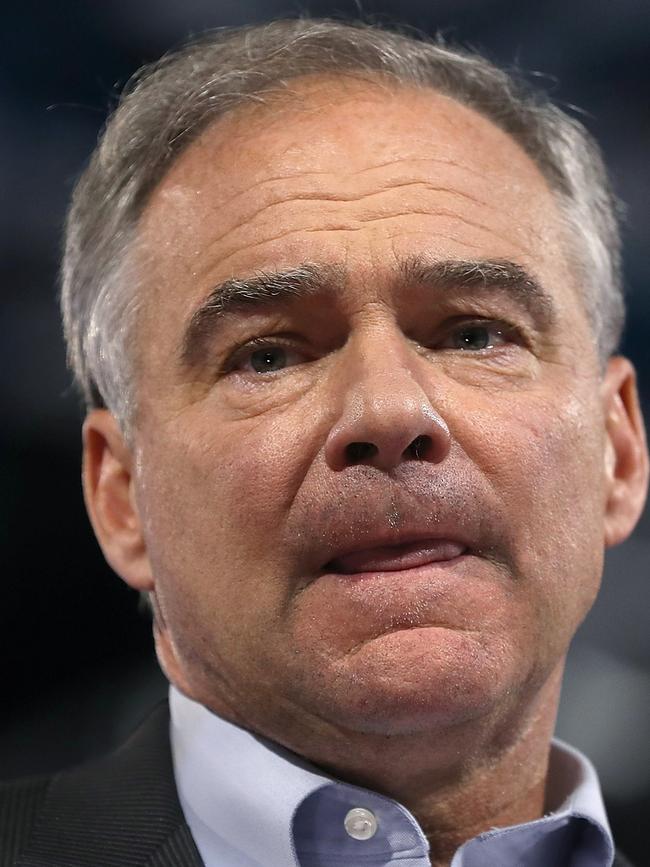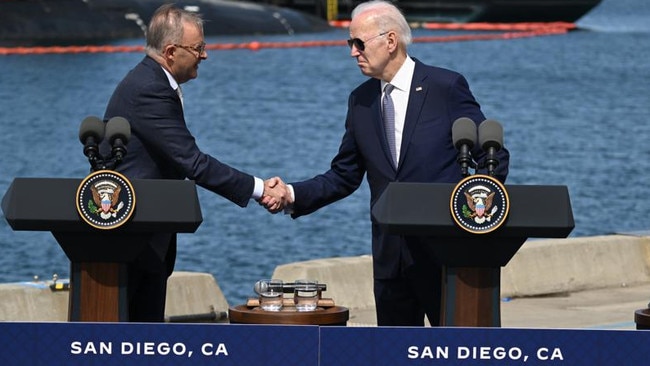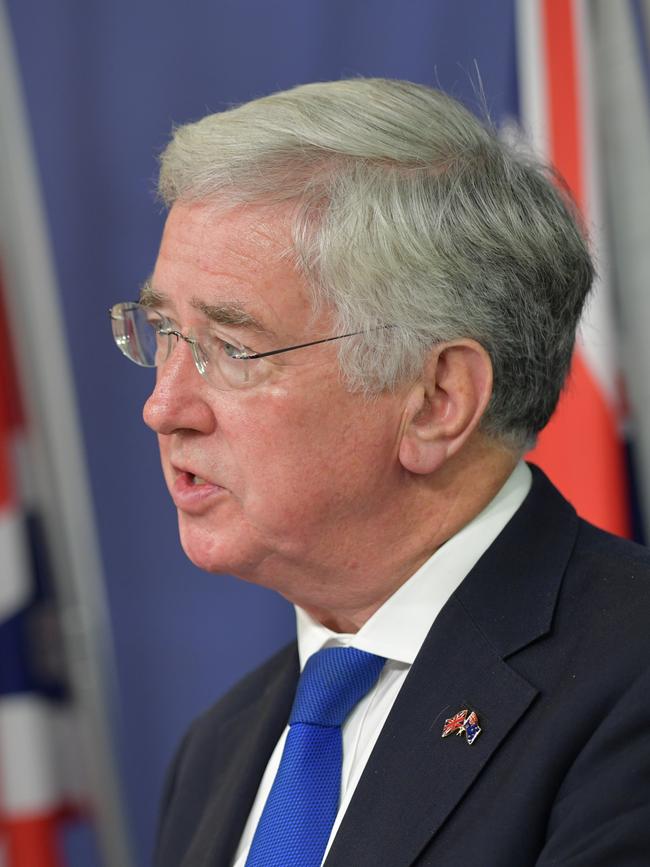Tariffs ‘risk damaging AUKUS with more expensive submarines’
With 35 per cent of the aluminium and steel needed for the submarines coming from Canada and the EU, Australia is warned the US could face difficulties bringing them in on time and on budget.

Sweeping US tariffs risk damaging the trilateral AUKUS pact by making it harder and more costly to produce submarines while undermining Washington’s ties with vital allies, a member of the Senate Armed Services Committee has warned.
Democratic Senator for Virginia Tim Kaine, who is also on the Senate Foreign Relations Committee, warned that 35 per cent of steel and aluminium used in US ships came from “trusted partners like Europe, England and Canada” and noted that America was already “having trouble getting these ships and subs on time, on budget.”
“Increase those prices and there’s going to be a problem. So the first concern that I have about the tariff regime is it’s a national sales tax that is really going to blitz us,” he said on Thursday (AEST).
Senator Kaine, who described himself as “the biggest AUKUS fan in the United States Senate,” also suggested that AUKUS pillar two would be more effective if it was narrowed down to nurturing greater co-operation across only a few key advanced technology areas.

Speaking at the Pyne & Partners Annual AUKUS Dinner in Washington, Senator Kaine made clear there was broad support for the trilateral security agreement between the US, UK and Australia in America. He acknowledged the Trump administration had made supportive statements.
But he expressed grave concerns over the new trade policy being pursued by Donald Trump and questioned whether the US President had his “nose out of joint” over AUKUS given it was secured during the Biden administration.
“We’ve got to deal in a more reasonable and responsible way with this tariff question,” he said. “Number one, I’m worried about it because it’s an attack on Virginians and on Americans.”
“The second concern I have is the message we send to allies. You know, allies are friends. And in the world, as I said, the alliances that we have are our strategic edge – where we have such a qualitative advantage over anyone else.”

He warned that if you refused to treat an ally well in a “critical area to them, it affects the rest of the relationship. And I’m very, very nervous about that.”
Retired Admiral Gary Roughead – one of only two officers to have commanded the US fleets in the Pacific and Atlantic – said the three AUKUS countries with the addition of Japan would become the most consequential actors in responding to the big strategic upheavals of the time.
“It appears that the Pacific will likely be the Trump administration’s main focus and it will be driven by trade, technology and Taiwan,” he said. “And with respect to Taiwan, my view is that we are too Taiwan focused. And we need a broader regional strategy and an invigorated AUKUS, pillar one, and, pillar two, is just that.
Admiral Roughead said AUKUS would help develop new alliance “command and control” mechanisms, noting that the “post-World War template that we have been using in Europe and in the Indo-Pacific will not do it in the future.”
He also said that AUKUS pillar two presented an “extraordinary opportunity” and, with regard to pillar one, argued that “the boat is the easy part.” He said personnel issues would become a pressing concern.
“But we need more public discussion and action in the US on the entire nuclear enterprise, the industrial base, for sure, but especially on human capital, nuclear trained personnel … are going to be in great demand, and they’re going to be very expensive to retain.”
Sir Michael Fallon, former British defence secretary, said it was important to remember that “President Trump, is not the enemy. Our enemies remain those totalitarian powers – China, Russia, Iran, North Korea, the ones that do not respect the treaties that they’ve signed.”
He identified the need for NATO allies to pay more for their own defence, but also stressed that trust between strategic partners was essential for effective cooperation. Sir Michael also advocated for the range of activities under AUKUS pillar two to be narrowed down and argued the security pact should serve as a model for emulation.
“We should now be doubling down,” he said. “We should be looking in fact at extending AUKUS. We should have an AUKUS equivalent for the High North bringing the United States, Canada and the northern European countries in NATO to consider what could be done through surveillance and satellite co-operation.”

Senator Kaine – who last week successfully led the Senate vote against the imposition of US tariffs on Canada by winning over four Republican rebels – said the President had too much power over tariffs.
“The notion that one person, any person could, on that one person’s say so, essentially impose a global tax regime and put the entire global economy into a tail spin – that’s just too much power to give to anyone,” he said. “And so we need to claw some of that power back and have it be a little more subject to some debate and some checks and balances.”
He also acknowledged that America had a lot of work to do to lift the submarine production rate to 2.3 boats per year. This is required under the AUKUS framework for America to be able to replace the at least three Virginia class submarines it has agreed to sell to Australia.
“Last year, we produced 1.1 Virginia class subs. So we have to get to two (submarines a year) for the US’ own defence needs. And we need to get to 2.3 to meet the obligations that we’ve committed to, to Australian partners,” he said. “And they’re heavily invested in us, so they’re entitled contractually to have us deliver as we have said we would.”
“We’ve made a lot of investments in the submarine industrial base that are starting to bear fruit. They don’t bear fruit immediately. They’re starting to.”
“Our assessment of Pillar Two is the sky’s the limit. But sometimes (when) the sky’s the limit and there’s unlimited things you can do together, what it needs is some definition and some choices,” he said.
“(It) needs some definition. Probably needs a couple of – in pillar two – choices of two or three key priorities. Instead of, ‘we can do everything.’ Let’s do two or three things and just say we’ll go after those two or three things and do them well.”







To join the conversation, please log in. Don't have an account? Register
Join the conversation, you are commenting as Logout